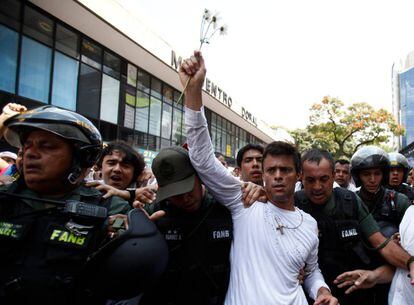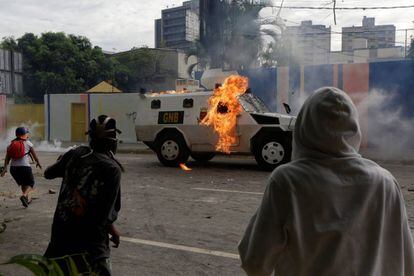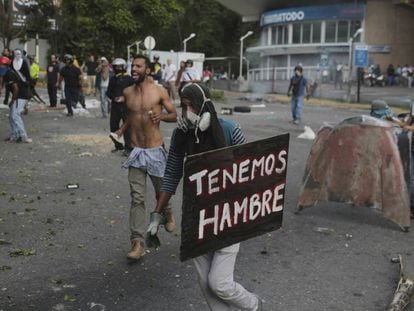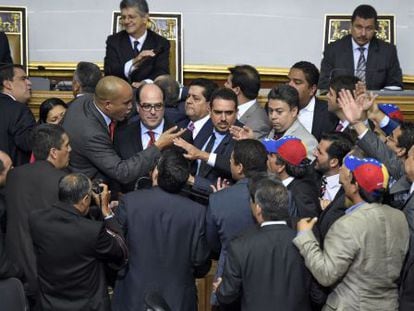Venezuela airs video to prove jailed opposition leader is alive and well
Move follows online rumors that Leopoldo López had been taken to a military hospital
On Wednesday evening, following rumors about the health of jailed opposition leader Leopoldo López, Venezuelan authorities released a brief “proof of life” video message from prison. López appeared on video to dispel the rumors after a local journalist tweeted Wednesday night that he had been transported from a maximum security prison outside Caracas, where has been serving a 14-year sentence since 2014, to hospital.

US Republican senator Marco Rubio, who earlier in the day presented a motion calling for sanctions to be imposed on Maduro’s government, tweeted he had confirmed López was hospitalized in a “very serious condition.”
López’s wife, Lilian Tintori, then tweeted that she was going to the hospital for information on her husband. She later tweeted she was told he was not at the hospital.
Shortly after, Lopez appeared on state television with prison bars behind him.
I have confirmed @leopoldolopez has been taken to a military hospital in #Venezuela in very serious condition.
— Marco Rubio (@marcorubio) May 4, 2017
“This is a proof of life message for my family. Today is May 3. It’s 9 pm,” he said.
“It’s a message for Lilian. I don't understand the reason why proof of life is needed at this moment. I send this message to my family, to my children and I am telling them that I am well.”
López’s family last week said they had not received news of him for a month and feared for his health.
New clashes
Earlier on Wednesday, anti-government demonstrators once again clashed with security forces during a march in the capital, Caracas, as they continued protesting President Nicolás Maduro’s plans to rewrite the Constitution.
The Venezuelan leader took a step forward to setting that process in motion on Wednesday when he handed over a decree to the government-controlled National Election Commission (CNE) to begin organizing elections for a National Constituent Assembly that would further sideline the existing National Assembly, where the opposition enjoys a majority.

Maduro’s decree was published in the Official Gazette and leaves the door open for the opposition to take part in the selection of the 500 delegates who will be tasked with writing a new Constitution or overhauling the existing text, said a spokesperson for the commission tasked with organizing the process. Seats in the assembly will be assigned in an election organized by the CNE through “universal, direct and secret vote.”
Hours before the decree was published, Maduro had suggested that the only candidates for election would be from the community and workers’ councils set up under the former president, Hugo Chávez, over the last 18 years, which under the present Constitution have no legal mandate
The president of the CNE, Tibisay Lucena, said that Venezuela was living through “a crucial moment in its political history” and that the start of the process “represented a great opportunity for Venezuelans to come together in a national debate.”
Shortly before meeting with Lucena, Maduro spoke to hundreds of followers gathered in front of the CNE, accusing the opposition of leading an armed insurrection to overthrow him. He referred to the seizure by a group of protesters of two fuel tankers in the central western state of Barquismeto who are demanding the release of 141 demonstrators who have been arrested. “I have ordered the state security forces to search for armed groups that have risen up against the Republic. We have the right to defend ourselves from terrorism and we will,” he said.
López’s family last week said they had not received news of him for a month
On Tuesday night in the city of Valencia, the capital of the Caribbean state of Carabobo, Jonathan Quintero, aged 21, died, bringing the death toll over the last month of protests to 30, sparked by the government-controlled Supreme Court’s move in late March to assume the powers of the National Assembly.
The CNE’s support for the ruling United Socialist Party of Venezuela leaves the opposition little alternative but to continue its daily street protests, which is hoping that the slide toward anarchy will create dissent within the administration. The leadership of the opposition MUD coalition insists that this year it will achieve its goal of general elections, along with foreign food and medical aid, as well as the release of political prisoners.
The opposition has refused to take part in the nationwide network of communal assemblies, but has no parallel structure of its own. But the CNE and the armed forces’ support for Maduro could force a rethink among some parties. The CNE has made it clear that its priority is organizing the new assembly, rather than regional elections delayed in December, a recall referendum, or a general election. In the meantime, a peaceful solution to Venezuela’s worsening situation seems further away.
English version by Nick Lyne.












































